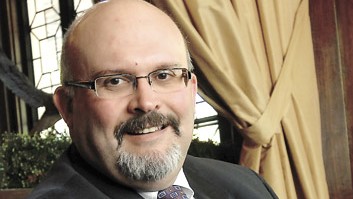One day after the American Bar Association concluded its first-ever virtual annual meeting, the organization’s deputy executive director and general counsel James Dimos has died from a heart attack.
Dimos joined the ABA in 2015 as deputy executive director, in which role he was second in charge of ABA staff, and took on the additional role of general counsel in 2019.
He was directly responsible for several functional areas of the ABA, including membership, the Professional Services Division, Legal Education and Admission to the Bar, the Center on Public Interest Law, strategy development, and the operations of the ABA’s Chicago and Washington, D.C., offices.
“We are devastated by the loss of Jim Dimos,” ABA Executive Director Jack Rives said in a statement provided by the ABA. “He was a big man with a great vision and huge accomplishments. His contributions to the legal profession over more than three decades will endure. We will do our best to carry on his unfinished business. We miss him terribly.”
“Jim was a dedicated member and leader of the American Bar Association who believed in fairness and justice for all,” said Patricia Lee Refo, who officially took office as ABA president just yesterday. “He was an accomplished lawyer but, more importantly, he was a devoted father and husband and a dear friend. He will be deeply missed by us all.”
For 29 years before joining the ABA, Dimos practiced law in Indianapolis, Ind., originally as a partner with the law firm Locke Reynolds and then with the law firm Frost Brown Todd after the two firms merged in 2009. His practice focused on intellectual property, First Amendment and media law, and business litigation.
In 2013-2014, he was president of the Indiana State Bar Association. He was a 1986 graduate of Washington University in St. Louis School of Law.
Dimos was co-author with Tracy Giles, the chair of the ABA’s standing committee on membership, of a 2018 memo that led the ABA to significantly lower its dues that year.
“Our internal data and market research clearly show that the ABA is on a trend line that will render it irrelevant and fiscally unviable,” they wrote. “As a result, we believe that a new membership model is the most practical first step that the association can take to secure its future.”
Earlier in his ABA tenure, Dimos was the subject of controversy over whether the ABA refused to publish a report by a committee of media lawyers that called Donald J. Trump a “libel bully.”
As The New York Times reported on Oct. 24, 2016, Dimos had written an email that objected to the use of that term and that said that other changes to the report were necessary to address “the legitimately held views of A.B.A. staff who are charged with managing the reputational and financial risk to the association.”
But the ABA did in fact publish the article and denied that it had ever refused to publish it, according to the ABA Journal, saying that staff had simply suggested some edits that were in keeping with the ABA’s commitment to non-partisanship.
When Dimos joined the ABA in 2015, Executive Director Jack Rives said:
“Jim has an extraordinary background for this very senior leadership position on the American Bar Association staff. He’s been a bar leader at every level, including president of the Indiana State Bar and service on our Board of Governors. He’s a perfect liaison to state and local bar associations and his years as a practicing attorney will also be invaluable.”
In a 2012 interview with The Indiana Lawyer magazine, Dimos was asked what he’d be if he hadn’t become a lawyer. “A sports broadcaster,” he answered.
Dimos leaves behind a wife, Kathy, and three children, Stephanie, Jennifer and Jonathan.
 Robert Ambrogi Blog
Robert Ambrogi Blog